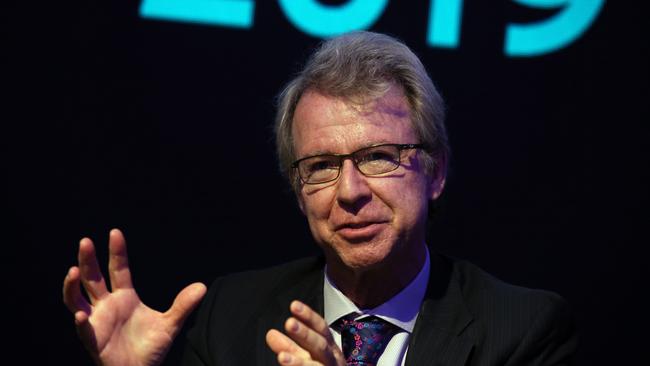Pent-up demand will drive the recovery
Economist Shane Oliver explains a new view on the RBA, the prospect of real wage rises and why he would take gold over bitcoin.

Earlier this week I caught up with Shane Oliver, the chief economist at AMP Capital, one of the most high-profile economists in the local market for the latest episode of the The Australian’s Money Cafe podcast. I wanted to ask the veteran economist about the outlook for next year and his views on the RBA’s recent policy controversy. Listeners wanted to hear what he had to say about inflation and crypto. Here’s an edited extract.
Are we really heading into a boom next year?
Yes, we are looking at a 5.5 per cent GDP forecast from the RBA – it’s a recovery of course, there is considerable pent up demand out there.
Isn’t that forecasting economic conditions that are twice as good as many people will have ever experienced?
Sure, most people will not have seen anything like it, but then again they have never seen anything as bad as what we have just been through.
But as we move into next winter, won’t we have restrictions looming again as they have in Europe right now?
We could, but I don’t want to be overly pessimistic: we are more vaccinated than they are, looking at the entire population Germany is around 69 per cent versus Australia at 72 per cent. Austria is only at 65 per cent that’s why they have had to mandate vaccination.
On the RBA, is it unusual for the central bank to be signalling its intentions for the next three years?
It is very unusual – there was a time they would not say anything. More recently, the bank has been communicating more than it ever did. Of course, what they say often changes – they said they had a clear target on the three-year yield – and a lot of people put a faith in that – and then it seemed to fall out of favour one day. It has made some people annoyed.
But the RBA was messaging this yield plan ... surely people did not believe they could actually control rates for three years?
Well, of course there was no guarantee. You can’t really rely on what they say – it’s just a guidance to what they think at the time.
So which would you prefer: the former silent RBA or the talking version?
I’d go back to the old way – all the talking creates noise – I’m not sure it helps.
Now in relation to this coming boom, we are being led to believe it will trigger a “great resignation” – with vast amounts of people quitting their jobs – do you think it will happen?
Put it this way, where is it in the labour turnover figures? If you look at our data up to the end of August it is showing about 8 per cent cent – when I was a kid it used to be about 17 per cent.
OK so no great resignation evidence to date. What about the prospect of wages actually rising – could this be the watershed moment for real wage increases?
Yes, I think so, we have been struggling for a long time. There is good chance we may have broken the back of it – money printing on this occasion has underpinned spending power.
We have less immigration just now, surely that pushes up wages as well?
Yes, competition for jobs is important – it all comes down to how fast immigration comes back. The downward pressure on wages is going to be lower than the past – unemployment could go to 4 per cent and with that there is a good chance we get a pick up in wages.
We are finally witnessing inflation. How relevant is the transition to renewable energy in driving up inflation?
It may cause a little bit, but it’s not the main driver – that’s monetary policy. It’s clear in Europe it happened because they did not get the power mix right, but as time goes by reliable renewable energy could actually lower inflation. After all, it’s cheaper – we could have lower energy prices once it is all introduced.
Talkingof inflation protection – if I gave you $10,000 and said you must put it in gold or bitcoin – which would you choose?
Gold prices are a little subdued right now despite the pick up in inflation – it does seem like – bitcoin is sucking the air out of it – but I’d have more faith in gold.
In the current setting, some people are putting forward bitcoin as the US dollar in an alternative new economy ... would you agree?
I look at the crypto boom as having strong similarities to the dotcom boom – there is something there but there is also a lot of noise. A lot of predictions we hear now may well come to pass in the long term but its very hard to read, It’s also very difficult to value digital assets. One thing we know is that if it collapses your income disappears.
Are you making a distinction then between the coins in crypto and the potential changes they signal such as blockchain-based DeFi (decentralised finance).
Yes, it could all mean a huge reduction in costs inside finance – we don’t even know yet what all this could be used for. But I would say to keep in mind that the central banks of the world could launch digital currencies and marginalise the incumbents of today. So if you are going to put money into this area make sure you are very diversified.
To hear the full version of The Australian’s Money Cafe Podcast Click Here




To join the conversation, please log in. Don't have an account? Register
Join the conversation, you are commenting as Logout